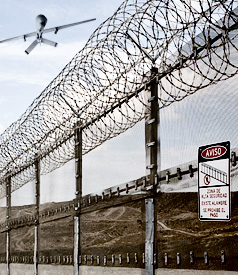After months of prodding from anti-immigration politicians, the entire US-Mexico border is now being watched by the Predator B unmanned surveillance aircraft commonly known as Predator drones. The news may comfort residents of border states where the details of Mexico’s brutal drug war continue to make headlines, but here’s some more comforting news: violent crime in US border states has decreased during the past decade, and some big border cities are the safest in the nation.
Here’s some uncomfortable news: several of the politicians who pushed to bring more Predator drones to the border have received campaign contributions from military contractors that make drone aircraft and parts.
But, on the bright side, the downward trend of violent crime in border states coupled with the $600 million President Barack Obama recently approved in spending on security technology like Predator drones and the deployment of 1,200 additional National Guard troops to the border indicates that the region is secure, really, really secure.
Even Homeland Security Secretary Jane Napolitano said the border is safer than ever as she briefed the press on the new Predator drones and the arrival of National Guard troops, according to The New York Times.
“Numbers don’t lie,” Napolitano added.
Violent crime rates in border states dropped along with national rates during that past decade. Between 2002 and 2008, the violent crime rate in Arizona dropped 19 percent, the rate in New Mexico dropped 11.5 percent and the rate in Texas dropped 12.4 percent, according to the Department of Justice statistics bureau.
An Associate Press report published in June showed that the top four big cities with the lowest violent crime rates in the US are located in border states. The cities are Phoenix, San Diego, El Paso and Austin.
Even though the crime rate has dropped, Homeland Security is spending millions on unprecedented security. Homeland Security has reported that the new security measures have brought an “unprecedented” and “historic” level of security to the border region, according to a release.
But for Predator Drone fans like Sen. John Cornyn (R-Texas), it all may not be enough. Cornyn has received $48,250 in campaign contributions during his political career from aircraft maker Lockheed Martin, according to political watchdog www.opensecrets.org. Lockheed Martin is military a contractor that develops drone aircraft technology and has competed for Predator drone contracts.
“Texans have had it with speeches and empty promises – we want immediate resources and attention to the growing security crisis along our southern border,” Cornyn said Wednesday. “I will continue to press the Department of Homeland Security to devote additional Predators to cover the Texas border, and pursue additional ways to achieve real border security.”
Earlier this year Cornyn teamed up with Sen. Kay Hutchinson (R-Texas) and put pressure on the Federal Aviation Administration to approve the use of Predator drones across the entire border.
In 2010, Hutchinson has received $15,000 in campaign contributions from a Political Action Committee (PAC) affiliated with Vaught Aircraft, a company that manufactures wings for the Global Hawk, a drone flown by the Air Force and Navy. In late May, she introduced legislation to give the border patrol $144 million to monitor all 2,000 miles of the border with drones seven days a week. Amendment co-sponsor Sen. Jon Kyl (R-Arizona) received $25,350 this year from a PAC and individuals in the Raytheon Co., a large military contractor that makes detection and ranging equipment for the Predator B drone.
“I am very pleased with today’s decision to expand UAV patrols to the entire Texas-Mexico border, but we still have more progress to make,” Hutchinson said on Wednesday.
A spokeswoman for General Atomics Aeronautical Systems, the main company that manufactures the Predator B drone, told Truthout that the price of a Predator varies per customer, but usually runs between $10 and $12 million.
When it comes to border security, numbers just don’t lie.
Join us in defending the truth before it’s too late
The future of independent journalism is uncertain, and the consequences of losing it are too grave to ignore. To ensure Truthout remains safe, strong, and free, we need to raise $47,000 in the next 8 days. Every dollar raised goes directly toward the costs of producing news you can trust.
Please give what you can — because by supporting us with a tax-deductible donation, you’re not just preserving a source of news, you’re helping to safeguard what’s left of our democracy.
